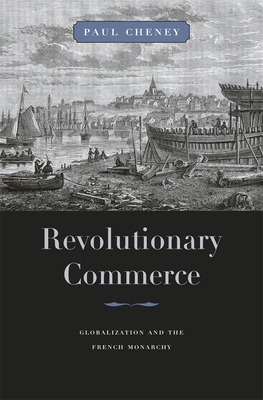

 Harvard University Press
Harvard University Press
Revolutionary Commerce: Globalization and the French Monarchy


Key Metrics
- Paul Cheney
- Harvard University Press
- Hardcover
- 9780674047266
- 9.3 X 6.3 X 1.1 inches
- 1.35 pounds
- History > Modern - 18th Century
- English
 Secure Transaction
Secure TransactionBook Description
Combining the intellectual history of the Enlightenment, Atlantic history, and the history of the French Revolution, Paul Cheney explores the political economy of globalization in eighteenth-century France.
The discovery of the New World and the rise of Europe's Atlantic economy brought unprecedented wealth. It also reordered the political balance among European states and threatened age-old social hierarchies within them. In this charged context, the French developed a science of commerce that aimed to benefit from this new wealth while containing its revolutionary effects. Montesquieu became a towering authority among reformist economic and political thinkers by developing a politics of fusion intended to reconcile France's aristocratic society and monarchical state with the needs and risks of international commerce. The Seven Years' War proved the weakness of this model, and after this watershed reforms that could guarantee shared prosperity at home and in the colonies remained elusive. Once the Revolution broke out in 1789, the contradictions that attended the growth of France's Atlantic economy helped to bring down the constitutional monarchy.
Drawing upon the writings of philosophes, diplomats, consuls of commerce, and merchants, Cheney rewrites the history of political economy in the Enlightenment era and provides a new interpretation of the relationship between capitalism and the French Revolution.
Author Bio
Paul Cheney is an historian of Europe with a specialization in old regime France and its colonial empire. Before beginning his PhD training in history at Columbia University, he studied political economy at the New School for Social Research. He has taught at Columbia University, the European College of Liberal Arts (Berlin), and the Queen's University of Belfast.
The unifying element of Professor Cheney’s work is an interest in early modern capitalism, and in particular the problem of how modern social and political forms gestated within traditional society. Old regime France serves as an excellent case study in this problem because of the way in which it combined real economic dynamism with deep-seated political and social impediments to growth. He addresses France’s integration into a globalized early modern economy in a methodology diverse way, drawing on intellectual, economic, and social history.
His first book, Revolutionary Commerce: Globalization in the French Monarchy (Harvard University Press, 2010), examined how French philosophes, merchants, and administrators understood the adaptability of the French monarchy to the modernizing forces of primitive globalization.
Currently, he is working on a second book entitled, Cul de Sac: Patrimony, Capitalism, and Slavery in French Saint-Domingue (University of Chicago Press, 2017), a micro-history of one plantation in France’s richest colony. He has published in such journals as The William and Mary Quarterly, Past & Present, Dix-Huitième siècle, and Les Annales historiques de la révolution française.
Source: The University of Chicago
Videos
No Videos
Community reviews
Write a ReviewNo Community reviews